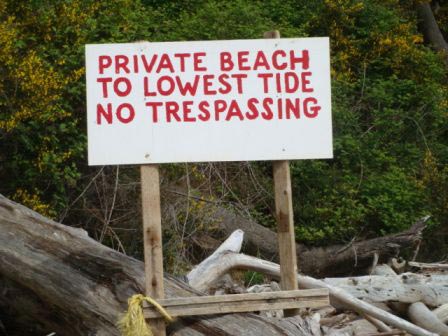
CASE INLET SHORELINE ASSOCIATION
3919 51st Ave Ct NW
Gig Harbor, WA 98335
Donations CPPSH REPORT, Dec. 2009 President's Message CISA Mailing
Public Trust Doctrine
The Public Trust Doctrine
"That generations of trustees have slept on public rights does not foreclose their successors from awakening."
Supreme Court of Arizona, 1991
The Public Trust Doctrine is the principle that certain lands and resources are preserved for public use, and that the government is required to maintain it for the public's use. The ancient laws of the Roman Emperor Justinian held that the seas and the shorelines were open to all the people. In the Magna Carta in England centuries later, public rights to the waters and shorelines were further strengthened. These public rights became law in England and subsequently became the common law of the United States. This was firmly established in Illinois Central Railroad v. Illinois in 1892. In that case, the Illinois legislature had granted a large portion of the Chicago harbor to the Illinois Central Railroad. A subsequent legislature sought to revoke the grant, claiming that the original grant should not have been permitted in the first place. The court held that the public trust doctrine prevented the government from alienating the public right to the lands under navigable waters. In subsequent cases it was held that this public right extended also to waters which were influenced by the tides regardless of whether or not they were navigable. This concept has also been found to apply to the natural resources, mineral or animal, contained in the intertidal sediments and water over those public trust lands. Private ownership does not take precedence over the rights of the people under the public trust.
Quotations
“For the average family, a walk on the beach is a free and easy amusement. It’s something most of us take quite for granted. To a public land manager, however, that same walk represents the exercise of a right with roots that can be traced back through the foundation of our state, to the foundation of our republic, and beyond that to the laws of
“Our walk on the beach is, in fact, defended by a legal doctrine more than 1,500 years old – a doctrine that holds that the land between the tides and under navigable waters is inalienably dedicated to public use. This is the famous public trust doctrine, and a whole string of court decisions, both at the federal and state levels, have confirmed its validity for the present day.”
“…when the state limits what private property owners can do with their property, as in zoning restrictions, property owners may object that the state has taken some part of the values of their property without compensation, which is a violation of the constitution. But the situation is very different when the state acts to protect its own property, or the property rights it holds in trust for the people under the public trust doctrine. Potentially, this is a much more powerful means of securing public rights, against which the “taking” argument has no effect. The Washington State Supreme Court held in the Orion case that private owners can expect no economic benefit from their lands if obtaining that benefit deprives the public of rights it holds under the public trust doctrine.”
Brian Boyle - WS Public Lands Commissioner, 1991
“This opinion (AG opinion of geoduck aquaculture) raises a number of questions for me. The Clamshacks case comes immediately to mind, since I am having difficulty reconciling that historic decision with the subject AG’s opinion. Anyone who ever fly fished the South Puget Sound nearshore for sea run cutthroat and silvers (coho salmon), or has ambitions to do so, will tell you that the first point bulleted below (AG opinion on geoduck aquaculture and the public’s use of the water), is also suspect, and probably outright erroneous. The (AG) opinion contains a very familiar error in conceiving that ‘normal public use’ is always associated with a park or similar public facility. The public trust doctrine rests on, and arises from, the fact that ancient and modern societies have used, and continue to use the entire surface and water column of marine and fresh waters for many millennia, albeit at varying degrees of intensity for different purposes.”
Doug Pineo - WS Department of Ecology, 2007
“The Public Trust Doctrine is a legal principle derived from English Common Law. The essence of the doctrine is that the waters of the state are a public resource owned by and available to all citizens equally for the purposes of navigation, conducting commerce, fishing, recreation and similar uses and that this trust is not invalidated by private ownership of the underlying land. The doctrine limits public and private use of tidelands and other shorelands to protect the public’s right to use the waters of the state.”
“Simply stated, the public trust doctrine provides protection of public ownership interests in certain uses of navigable waters and underlying lands, including navigation, commerce, fisheries, recreation and environmental quality. While tidelands may be sold into private ownership through conveyance of the jus privatum, the public trust doctrine reserves a public property interest, the jus publicum, in these lands and waters flowing over them.”
“This public interest is a property right, like an easement. If the state wished to control the use of this burden, including use by either the private owner or by the public, the state is merely controlling a right that it already owns. It is not regulating private property.”
“The Washington Supreme Court has described the public trust doctrine as similar to a covenant running with the land. Unlike other burdens on private property, however, landowners need receive no express notice of the public trust burdens on their lands.”
The Public Trust Doctrine and Coastal Zone Management, 1991
“The origins of the public trust doctrine are traceable to Roman law concepts of common property. Under Roman law, the air, the rivers, the sea and the seashore were incapable of private ownership; they were dedicated to the use of the public. This concept that tide and submerged lands are unique and that the state holds them in trust for the people has endured throughout the ages.”
California State Lands Commission
“The public trust is more than an affirmation of state power to use public property for public purposes. It is an affirmation of the duty of the state to protect the people’s common heritage of streams, lakes, marshlands and tidelands, surrendering that right of protection only in rare cases when the abandonment of that right is consistent with the purposes of the trust. Our dwindling natural resources deserve no less.”
“While the state may convey title to tidelands and shorelands, the private owner does not receive the ‘full bundle of sticks’ that all first year law students learn about in property law. Instead, the state retains a ‘jus publicum’ or public easement on the lands. The state may no more dispose of these public rights than it may abdicate its police powers to run the government or preserve the peace.”
Center for Environmental Law and Policy
Recreation:
“The right of the public to use Public Trust lands and waters for recreational purposes is recognized in most states as traditional.”
Environmental Protection:
“The preservation of Public Trust resources is an extension of the protection of public uses of these resources, and has been recognized in several states as a trust responsibility.”
Applicable Waters and Shorelines:
In general, the following are subject to the Public Trust Doctrine:
*Tidewaters to their farthest reaches
*Tidelands
*Navigable-in-fact waters
*Permanently submerged lands, including those extending seaward to the limit of state ownership
NOAA Coastal Services Center
"Local governments should consider public trust concepts when developing comprehensive plans, development regulations and shoreline master programs."
WS Department of Ecology
"As noted, the jus publicum interest in trust lands cannot be conveyed or alienated to private ownership, for the State cannot abdicate its trust responsibilities to the people. The jus privatum interest, however, may be and often is, conveyed into private ownership. There are strict limitations upon the State in order to convey the jus privatum to private ownership. The legislature must act through legislation to authorize the conveyance. The conveyance must be described in clear and definite language, with all ambiguities construed in favor of the State and against the grantee. The conveyance must primarily further the public interest, with benefits to private parties being secondary or corollary. There must be no substantial impairment of the public interest in the lands and waters remaining. Non-compliance with any of these requirements violates the Public Trust Doctrine, and can render the conveyance void."
"...all of the public's trust rights are dominant to the private rights."
"...the private trust land owner's interest in the trust land are subservient to the jus publicum. Further, the privately held trust land was conveyed subject to the Public Trust Doctrine from the outset and therefore nothing has been taken. As a result, a private owner cannot have any reasonable investment-backed expectations."
Putting the Public Trust Doctrine to Work
Coastal States Organization, Washington, D.C.
______________________________________________________________
Foss/Taylor Shellfish Violation of Public Trust Rights

Foss erected this sign on Public Trust tidelands, effectively denying the jus publicum rights of the public.
"North Bay (Foss) was made aware that some of the neighbors to the North believe they have permission to come and go on the North Bay property (tidelands) as they so chose. This has included bringing "experts" onto North Bay's property to attempt to limit North Bay's ability to derive economic benefit from the property." "...North Bay cannot and will not allow trespass upon its property. North Bay's property includes the tidelands exposed at low tide. Please do not enter the property, including grounding boats on the bottom when the tide would allow that to occur on land exposed at low tide. Do not go on the beach or uplands. If you do so, legal action will be taken." "North Bay does not grant permission to you to enter or remain on its lands."
Jerry R. Kimball, on behalf of Leslie Foss, May 5, 2008
"As noted, the Foss family property includes the uplands, the beach and the tidelands." "...the Foss family property is private and there is no authority for the public to enter on to it." The family (Foss) owns a mile of beachfront. They post it at each end as private property. They own the tidelands from ordinary high water to extreme low tide. Anyone walking on the beach is trespassing." "...if she were to strike the bottom with her (kayak) paddle she would be trespassing."
Jerry R. Kimball, attorney for North Bay Partners (Leslie Foss et al), Jan. 22, 2008
2002 Letter from Taylor Shellfish to Walker
CISA Comments
The Foss neighbors clearly have prescriptive rights to enter and traverse the Foss tidelands anytime and anyhow they choose. The neighbors, as well as the public, also have the right to enter and traverse the Foss tidelands per jus publicum rights under the Public Trust Doctrine. These rights are violated by Foss through the use of intimidation: 'No Trespassing' signs and threats of legal action. Also, under the public trust, Foss has no legitimate right to expect any economic benefit from trust tidelands.
Technically, it is Foss and Taylor Shellfish that are trespassing, since their geoduck PVC tubes and nets protrude into the water column and utilize public resources.
Citizen's Complaints
Henderson Bay Eagle
Gibbons' false accusations and Hendricks' Certificate of Compliance
Johnson Point
Estimating Compensation for Injury to Publicly Owned Marine Resources
The Use of the Public Trust Doctrine as a Management Tool
______________________________________________________________
Case Law
Court of Appeals, Bainbridge v. Brennan, pedestrian travel across privately owned tidelands
CELP Articles
Enjoys Long Walks on the Beach...WA Law Review, 2006
Wilbur v. Gallagher
Marks v. Whitney
AG opinion on Seashore Conservation Act
AG opinion on public access to beaches in Puget Sound